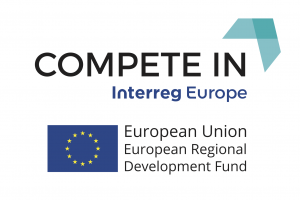 The project concerns the internationalization of SMEs; the key issue related to the development of this sector of enterprises on a global scale, occurring in EU countries, is the weakness of companies due to the requirement of incurring high investment expenditures and uncertainty of achieving the expected level of investment effectiveness.
The project concerns the internationalization of SMEs; the key issue related to the development of this sector of enterprises on a global scale, occurring in EU countries, is the weakness of companies due to the requirement of incurring high investment expenditures and uncertainty of achieving the expected level of investment effectiveness.
Regions can help solve these problems by supporting the internationalization of SMEs based on their international relations, which each of them creates and maintains, and with the use of territorial links. The COMPETE IN project concerns the internationalization of SMEs; the key issue related to the development of this sector of enterprises on a global scale, occurring in European Union countries, is the weakness of companies – especially due to the requirement of incurring high investment expenditures and uncertainty of achieving the expected level of investment effectiveness.
Purpose of the COMPETE IN project is to improve regional policy within the scope of internationalization with the use of a new territorial approach to support activities and involvement of SMEs inactions on the international market.
In the current situation, regions use many tools supporting internationalization, while in the long run, they do not provide the expected effectiveness, as only 13% of SMEs operate outside the community market.
This project implements a new methodology: an approach to internationalization will not be addressed directly to SMEs, but thorough orientation towards regional systems of outstanding competences, bearing in mind that the main objective is to support activities of SMEs
This results in a completely new approach, which assumes that cities and regions are catalysts for internationalization processes, because – as administration entities – they play an active role among local and regional stakeholders since it is not individual companies, only regions that are becoming players on international markets.
The main results of the project are focused on improving policies created by regions to build a regional internationalization system and support cooperation processes at the local level among all significant stakeholders: SMEs, universities, economic and professional self-governments as well as city authorities.
Partnership structure:
I. Lead partner
- Municipality of Reggio Emilia – Italy
II. Partners
- IVACE Institute of Entrepreneurship and Competitiveness, Valencia – Spain,
- Upper Silesian Agency for Entrepreneurship and Development Ltd. – Poland
- The self-Government of the Wielkopolskie Voivodeship – Poland,
- Wakefield Metropolitan Area – United Kingdom,
- Gävle Municipality – Sweden,
- ERVET – Economic Development Agency of the Emilia Romagna Region – Italy.
III. Technical cooperation
Foundation of International Projects – E35 Reggio Emilia.
Idea of the Project:
I.Territorial internationalization of the region and SMEs as leverage for competitiveness and development;
II. Internationalization understood as a way of:
- incentives for investors,
- creating international partnerships,
- territory recognition.
Purpose of the project
Due to the imperfection of market mechanisms, local and regional authorities must play a key role as entities supporting the internationalization processes of SMEs, which will make it possible to overcome these imperfections and are oriented at creating conditions for long-term economic development.
Leverages of internationalization: relations of the structure, culture, and history of the area, products
Key actors: local authorities, professional and economic associations, research centers, research centers, individual companies, business networks.
Beneficiairies: SMEs, SME networks, cooperatives, research centers, large enterprises
Innovative methodology
Taking into account the challenges that public entities have to face in support of internationalization (e.g. low efficiency of available public tools, support for short-term activities – participation in fairs, cooperation networks, sectoral support), it is possible to develop innovative tools within the project, including:
- diversifying the approach to internationalization in the understanding of cities, region and other intermediate institutions,
a stable Platform, based on the cooperation of regional stakeholders, to identify needs, refine solutions and long-term orientation of activities for the benefit of SMEs,
construction of an innovative tool for territorial internationalization and internationalization of companies,
the interregional dimension of the project as a key element of the EU policy, oriented at increasing competitiveness and achieving a leading role on a global scale, i.e. based on a knowledge-based economy respecting the principles of social cohesion,
exchange of good practices for knowledge transfer and improvement of competences – international cooperation reduces disparities between EU member states, fosters interregional synergy between cooperating regions.
Project objectives
Two types of objectives are foreseen:
1. Strategic
- unification of activities between planning policy, integrated activities, tools, resources offered and other forms of support increasing the effectiveness of internationalization at the local level;
support and integration of local organizations to avoid duplication of similar activities/approaches at different levels, and using a range of skills and experiences while working for common goals and developing tools.
2. Thematic
- creating a competitive local identity (branding) to support the region, SMEs and business entities in identifying and recognizing new markets;
- sharing and opening up to existing institutional relations (with a network of stakeholders), as leverage that increases attractiveness and allows companies to recognize foreign markets;
- cooperation for competitiveness (value chain): vision and joint work that allows the creation of added value, supply chain planning, increasing the ability to respond to market needs and trends.

Newsletter
We would like to invite you to read the summary of the first year of operation of the COMPETE IN project:
- newsletter no. 1, March 2017:
compete_in_newsletter_no_1_pl.pdf;
compete_in_newsletter_no_1_en.pdf
- newsletter no. 2, August 2017:
compete_in_newsletter_no_2_en.pdf
